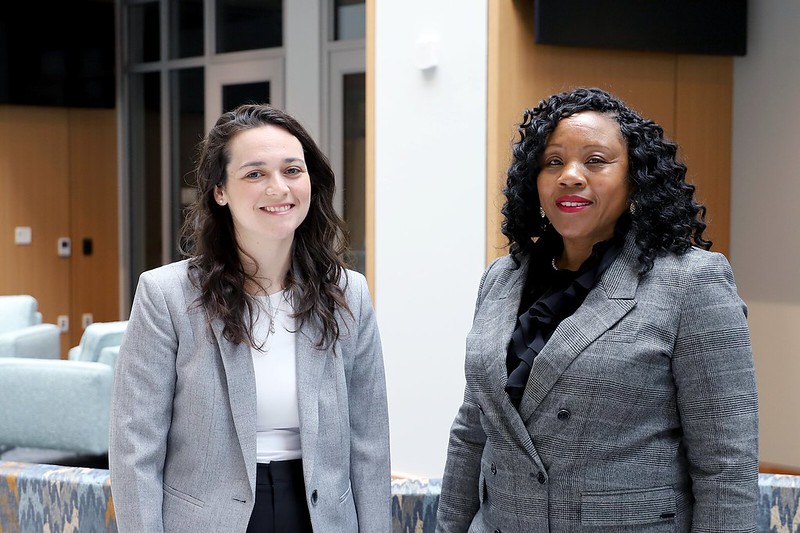
Learn more about MTEP Outreach Hub member Lizzy Harkey, Ph.D. student in the College of Education at Auburn University.
How long have you been at your institution?
LH: I am completing my fourth year at Auburn University in the mathematics education Ph.D. program. I started at Auburn in August 2021.
Who is your favorite mathematician or educator character in a book, movie or TV show?
LH: My favorite mathematicians from a book/movie would be Katherine Johnson, Mary Jackson, and Dorothy Vaughan from Hidden Figures. I loved learning about their lives and their stories. My favorite educator is Sister Mary Clarence from the movie Sister Act 2: Back in the Habit. The way she relates to her students and works to build up the community is powerful even though she is really—a Las Vegas headliner. Also, who doesn’t love a few songs to sing along to?
What inspired you to get involved in mathematics education research?
LH: My mom inspired me as a mathematics teacher educator and mathematics education researcher. I grew up watching her love her work teaching future mathematics teachers, working with K-12 students, and supporting mathematics teachers. As I got older, I continued to learn more about what she was doing, and I thought the work was important and rewarding.
What skills or knowledge are you learning through working with the partnership that you find most useful in your career?
LH: Through my involvement with MTEP, I am gaining valuable experience in building and sustaining meaningful relationships with individuals committed to mathematics teacher education—both across institutions and within local communities. I am also engaging with mathematics teacher educators from diverse institutions nationwide, whose insights and perspectives are invaluable as I prepare to start my career in the future.
What advice would you give to students who want to pursue careers in mathematics teaching, teacher preparation, and/or education research?
LH: Remember your why. I know—it sounds cheesy. But this spring, one of the teacher candidates had all her students use paint to put their fingerprints on a stole for her to wear during graduation. Embroidered on the bottom were the words: My why.
For me, my why is the goal for K-12 students to have positive experiences in their mathematics classes that recognizes and values each student, while demonstrating how mathematics is a part of their life. I hope to continue supporting pre-service and in-service teachers in enacting this kind of instruction.
We all have our reasons for choosing the paths we do. I could say more about mine, but remembering my why keeps me grounded, and the teacher candidate’s stole was a reminder to pause and reconnect.
How is your involvement in MTEP work worthwhile to your graduate school/professional journey?
LH: As a graduate assistant with MTEP Outreach, I have been able to work with my advisor to plan meetings that allow invested individuals to discuss and plan actionable steps on important topics in secondary mathematics education. These experiences are worthwhile, as they’ve given me insight into how MTEP 2.0 operates behind the scenes and what it takes to organize and facilitate such meaningful conversations. Additionally, as I mentioned earlier, I’ve had the chance to connect with mathematics teacher educators from institutions across the country and learn about their programs.
What skill do you think is most valuable for students considering a career in mathematics teaching, teacher preparation, and/or education research?
I believe that the ability to listen is a skill that transcends all aspects of this work. In mathematics teaching, listening closely to students and making sense of their thinking is essential to effectively advancing their learning. The same holds true when working with pre-service teachers, where understanding their perspectives is key to meaningful support and growth. Even in educational research, which often involves teachers and/or students as participants, attentive listening allows the work to be grounded in their lived experiences, allowing us to better understand and learn from their perspectives. In every context, listening creates space for engagement based on what individuals share, rather than assumptions or expectations.
Tell us about the most rewarding mathematics education experience that you have had.
I really enjoyed working as a university supervisor for a paired placement* internship with two teacher candidates. I loved being in a K-12 setting and working with the teacher candidates and their mentor teacher to support them to meet their self-determined goals. It was incredibly rewarding to see the growth that the teacher candidates demonstrated together and to be able to discuss with them how much they had grown.
*Auburn University’s use of the paired placement model is based on the work of MTEP's Clinical Research Action Cluster. See mtep.info/cerac.